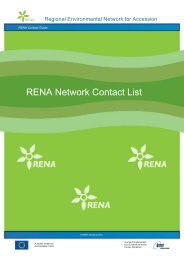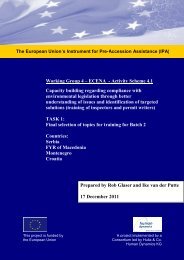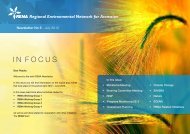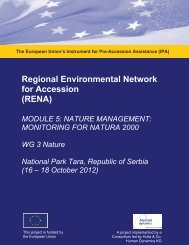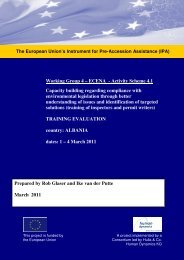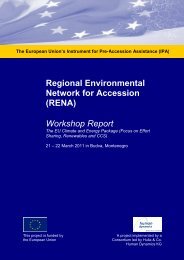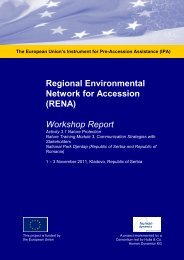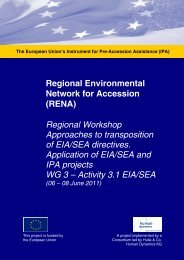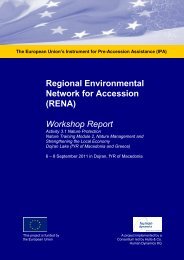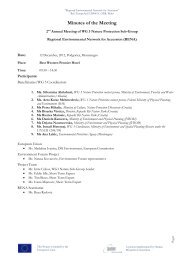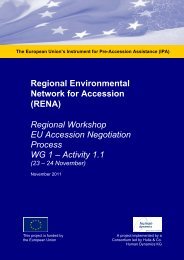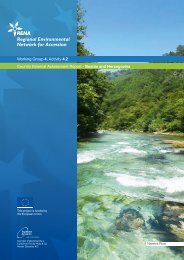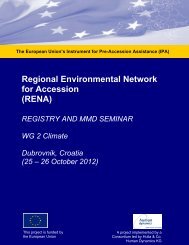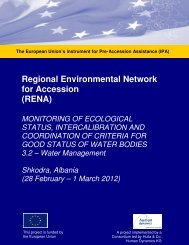3rd Interim report September 2011- March 2012.pdf - Renanetwork.org
3rd Interim report September 2011- March 2012.pdf - Renanetwork.org
3rd Interim report September 2011- March 2012.pdf - Renanetwork.org
Create successful ePaper yourself
Turn your PDF publications into a flip-book with our unique Google optimized e-Paper software.
“Regional Environmental Network for Accession”<br />
Ref: EuropeAid/128906/C/SER/Multi<br />
Official welcoming and approval of the agenda<br />
The meeting was opened by Mr. Csikos, Nature Working Group Leader by thanking all participants for coming<br />
to the Second Annual meeting of WG 3 Nature Sub-Group to approve the work plan for 2012, and to discuss<br />
ideas for the RENA II project,. Mr. Csikos outlined in brief the main elements of the agenda and asked Ms<br />
Lekic, the representative of the host country, and Ms Madalina Ivanica to greet the participants. Furthermore,<br />
the participants were invited to briefly introduce themselves.<br />
The proposed agenda was unanimously approved.<br />
Status of Project Implementation in RENA WG 3 Nature (Imre Csikos)<br />
Mr Csikos discussed the RENA nature activities that were implemented, according to the RENA Work plan, in<br />
<strong>2011</strong>. Three trainings were carried out: Kopacki Rit-Gornje Podunavlje (9-11 May, Croatia), Dojran Lake (6-8<br />
Sept., fYROM) and NP Djerdap (1-3 Nov., Serbia). Mr Csikos summarised the results of the training and<br />
presented lessons for the future. He also talked about the economic impact of nature values and ecosystem<br />
services of the environment. As a conclusion Mr Csikos mentioned that it would be ideal to ensure continuity of<br />
the training by enabling the same people to come. Also, RENA experts can assist in development of cross<br />
border nature projects. However, initiative is needed from beneficiaries on this issue. In case of cross border<br />
nature project development a more pro-active involvement of national Ministry requested because of<br />
international dimension.<br />
During discussion, Ms Ivanica stressed that the momentum of the project should be used to continue with<br />
further activities in RENA II project. Ms Kovacevic informed about the biodiversity research in Serbia,<br />
Montenegro and Albania and emphasised the need for a greater stakeholder involvement in nature projects.<br />
Also, developing project proposals should be encouraged by the national governments as the level of capacity for<br />
drafting projects in Montenegro is quite low. She sees Taiex as a great tool to assist in this. Furthermore, she<br />
hopes Environmental Forum will be part of the RENA II. Ms Ivanica assured her that NGO participation<br />
would be more that welcomed.<br />
Ms Csikos suggested that in the next RENA project, 2-3 protected sites could be selected for a detailed<br />
preparation of management plans. These plans would be result of a 2-year process with strong stakeholder<br />
involvement. Mr Bines mentioned the case of Poland where some 50 management plans were drafted within the<br />
same time frame. He also mentioned that a mechanism for stakeholder involvement needs to be in place. Mr<br />
Csikos commented that economic interests are high on the agenda in the entire region. Mr Bines explained that<br />
Natura 2000 is perceived as a reason for concern for economic stakeholders. Mr Csikos stressed the importance<br />
of raising public awareness, especially at the policy level, which also implies the involvement of the European<br />
Commission. Ms Kovacevic mentioned that it would also be a good idea to carry out impact assessment of<br />
climate change in the region.<br />
The work plan for the next year was unanimously approved.<br />
Managing Kopacki Rit Nature Park (Biserka Vistica, Director, Kopacki Rit Nature Park)<br />
Ms Biserka Vistica’s first presentation focused on the Nature Park Kopacki Rit and its ecosystem services. She<br />
also talked about plan and animal species which are characteristic for the Park and the monitoring methods used<br />
to improve the Park management. The second presentation centred on communicating methods used in<br />
Kopacki rit, target audiences and the message. She also talked about communication media, the staff skills and<br />
training which has been provided to enable the staff to successfully tackle the various management issues.<br />
Stakeholder Involvement in Management Planning (Tim Bines)<br />
Mr Bines talked about the importance of stakeholders in the management planning process. He presented<br />
identification and categorisation of stakeholders and stressed the significance of the messages, the medium and<br />
the process.<br />
Round Table Discussion<br />
Mr Csikos provided information about the impact of previous trainings: articles and photos on the websites of<br />
Kopacki rit Nature Park, National Park Djerdap and the Turkish Ministry of Environment. Also, Nature Park<br />
Kopacki Rit and the National Park Djerdap initiated informal cooperation during the 3 rd regional training in<br />
Serbia<br />
Page2<br />
This Project is funded by the<br />
European Union<br />
A project implemented by Human<br />
Dynamics Consortium



